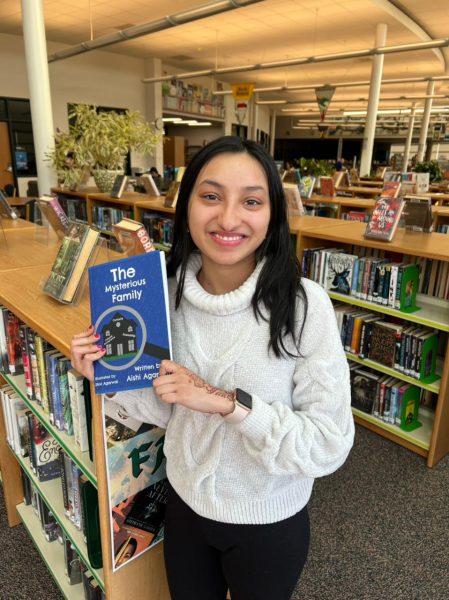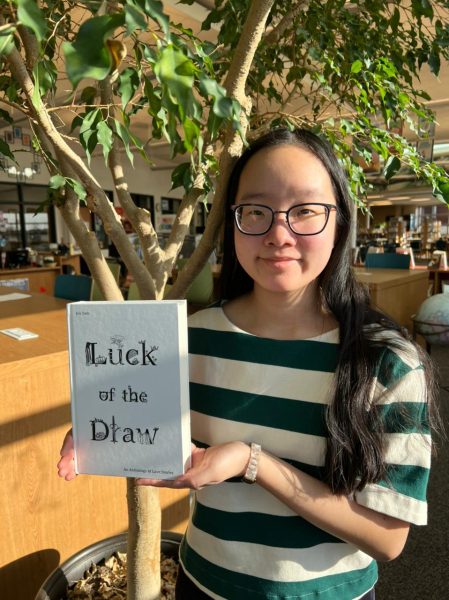The smell of fresh parchment usually fills the air whenever pages of a book are flipped through. Though it’s just ink on paper, books can be much more than that to some people.
Books can offer belonging and create communities. They can serve as a tool for growth of knowledge and a person’s character. Navigating through the halls of VHHS, there are three Cougar authors who have been hoping to impact different communities through their storytelling.
Having gathered inspiration from the life around them to craft tales of love, support, hardships and adventures, these authors have spent countless hours building fictional worlds and bringing stories to life, aiming to inspire other readers and leave an impact on the world.
Ellen Macias
As Ellen Macias’ eyes skimmed through the pages of the book she was reading, absorbing the words imprinted on the paper, she couldn’t help but feel inspired to create her own stories.
Macias, an English teacher at VHHS, found solace in making up her own tales to entertain herself and her sons amid the Covid-19 lockdown. A natural storyteller, the fact she was temporarily stuck at home didn’t stop her mind from wandering through extraordinary places.
Over time, telling children’s stories evolved into the desire to write a full-length novel. Then, The First Rays at Dawn was created.
Macias saw the opportunity to challenge herself and try something new, blending her storytelling passion and English teaching background into the project.
“The story started telling itself to me, so I just started writing it,” she said.
The First Rays at Dawn is a coming-of-age story about two women living in different time periods as they learn how to fight the oppression they face and how to support the women around them.
“[The story is] this idea of women, across generations, lifting each other up and caring about the progress of [other] women, not competing against each other,” Macias said.

One life experience that influenced Macias’ work was being a part of Dare to Empower, an affinity group at D128.
She explained that six years ago, before the creation of the club — which started as a group of female-identifying staff coming together — D128’s administration was predominantly male, and the female-identifying individuals employed by the district faced many complications over maternity leave and not feeling heard.
According to Macias, observing these women’s efforts to promote change, and for the first time being part of a sisterhood, as she described it, left an impact on her. This was later translated into her book.
“[Dare to Empower’s creation] was a really cool, organic way that female-identifying people in our district came together to support one another in various areas of need,” she said. “The women in this building have really supported, mentored, and lifted each other up at different times and come together. [They’ve] been able to accomplish really cool things.”
Macias also explained how gradually getting more involved with writing the book has allowed her to dismantle some beliefs regarding her age and what she’s not allowed to do. She realized that just because she’s committed her whole life to being a teacher, for example, it doesn’t mean she can’t try something new, despite her age. She believes we’re constantly growing and changing.
“Well, I’m 40 years old, and I’ve been a teacher, I’ve been a mother […] I knew nothing about writing a book, and I was like ‘this feels cool, I’ll just try this thing out,’” she said.
Macias believes that if you’re inspired to do something that you haven’t done before, it’s essential to try it anyway. When doing something new, she thinks people should work to avoid negative self-talk and sabotaging thoughts about their capacity to do something out of their comfort zone.
The First Rays of Dawn is in its post-production process, and it is expected to come out on March 28, 2024. It will be published by Pegasus, a London-based publishing company, whom Macias has been communicating with to work through the publishing process. During the process, she held responsibilities such as approving manuscripts, edits, and the cover art.
Over these four years of creating her book, Macias found the process to be a pleasant surprise. It offered her lots of room for growth. Her hope is for other people to not get too stuck inside their heads when diving into something new.
“Everybody has something to say. Every person has a unique story and a unique style. Everybody has a lived experience that gives them interesting insights into the world,” Macias said. “So, just try it. Worst case, you’ve written something and it lives in the world. And best case, maybe it gets seen, and maybe it changes somebody.”

Aishi Agarwal
As elementary schooler Aishi Agarwal (11) raised her hand for the hundredth time, eager to understand how the world around her works, the teacher scolded her again. Then, some time after that, the teacher expressed how the girl asks too much and should keep her questions to herself.
Following that, Agarwal encountered difficulties in keeping her curious spirit alive.
“I stopped asking questions for a while, and I feel like that’s where you stop growing,” Agarwal said. “That’s why I wanted to write a book about what it means to embrace your curiosity and to instill the lesson that it’s not a bad thing to be curious.”
The Mysterious Family, a book for elementary-aged children, follows Lyra, who goes on different quests to learn more about her mysterious neighbors. She discovers how to be authentically curious, embrace diversity, and develop new friendships.
Agarwal wrote the book when she was seven years old. Then, six months ago, she decided to revisit the project to add more depth and details to the story.
“[I had written] just the framework for the story, and I wanted to make it inspiring in some way,” she said. “My parents helped me the most [with feedback and proofreading].”
While expanding the content of the book, Agarwal explored adding the theme of cultural acceptance to express how all differences should be embraced.
“I wanted [my story] to [relate to] all different cultures, who have different traditions, ways of doing things, dressing, and different foods to eat,” she said. “You have to be accepting of every single culture.”
Agarwal also gained a deeper understanding of her current self by exploring the main theme of curiosity even further.
“Sometimes I struggle to raise my hand in class. I shouldn’t, but I think that [I might] lead the teacher astray. But teachers welcome those things,” she said. “[I still] need to embrace the fact that I’m curious, and I have [been] since I was a little kid, until that incident in elementary school.”
As for other writers, Agarwal advises to be passionate about the chosen topic.
“Whatever you write about has to come from the heart. I was really passionate about curiosity — that’s the theme I was able to explore in my book,” she said. “If you don’t believe in being curious, don’t write about curiosity, because it’ll just never be conveyed the way you want it to.”
Agarwal is currently reaching out to different libraries and elementary schools where she can share her work. The book is currently available for purchase on Amazon.
“I want [people] to take away the fact that no question is a bad question — all questions are accepted,” she said. “It’s never a bad thing to ask a lot of questions. That’s when you’re growing your knowledge and who you are as a person.”

Iris Tom
Fingers paced across the keyboard as Iris Tom (12) uncovered the depths of the fantasy genre through her writing exercises. Though she was familiar with the whimsy and adventure of these stories, romance seemed like a foreign concept.
That’s when Tom decided to expand her writing skills, and Luck of The Draw, a book of short stories, was born. The title shares the name with the first story, which started as an exercise that later inspired the rest of the book — it takes place in the Kingdom of Luck.
After writing the tale, Tom faced a dilemma.
“The premise [of the story] is the Kingdom of Luck, and I found it very strange that there was just this one kingdom. What about the other kingdoms?” she said. “From there, I came up with the idea for seven more stories and kingdoms.”
The book is an anthology of love stories connected across eight kingdoms. A six hundred and eighty four page manuscript, Tom worked on it for over three years, writing a majority of it during her sophomore year.
Across these eight kingdoms, readers can follow princes, blacksmiths, shepherds, scientists, orphans, handmaidens, and fated and doomed couples, as they “discover the heights of humanity in themselves,” according to Tom’s website.
Tom counted on Beta readers, who revise written work for errors and improvements, to help with feedback and talk about the ideas she wanted to incorporate into her tales.
“It’s gratifying to see how all of those hours [working] have made something exciting — [to] get the physical copy and be like ‘Wow! I wrote that,’” she said.
Additionally, Tom developed her skills through mentoring over two summers with Augustus Rose, Assistant Professor of Practice in the Arts at The University of Chicago.
“I didn’t know you could do this, but you can just email [college professors],” Tom said.
Professor Rose advised Tom to know which part of her book she’d prioritize when working through revisions, be it the literary devices or worldbuilding.
“I prioritize sentences and try to make every sentence the best it can be. [Professor Rose] had different priorities, like plot and characters,” Tom said.
Still, Tom advises other writers to not get too stuck when revising their work, hoping for perfection.
“[Overanalyzing the story] is taking away from the joy of [writing] – you start to lose your mind when you go that specific,” she said.
Another piece of advice Tom shared from her book writing process is that “getting inspired” doesn’t exist. Inspiration just is.
“Characters occupy a space in your head, and you just have to write them. You’re not making a character; they don’t need to be made,” Tom said.
